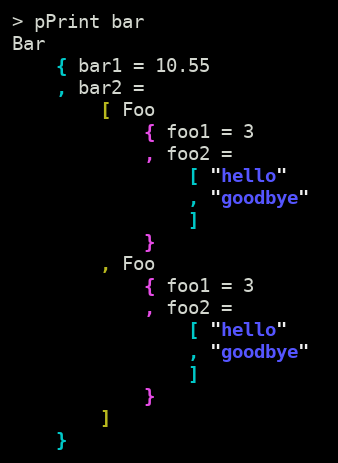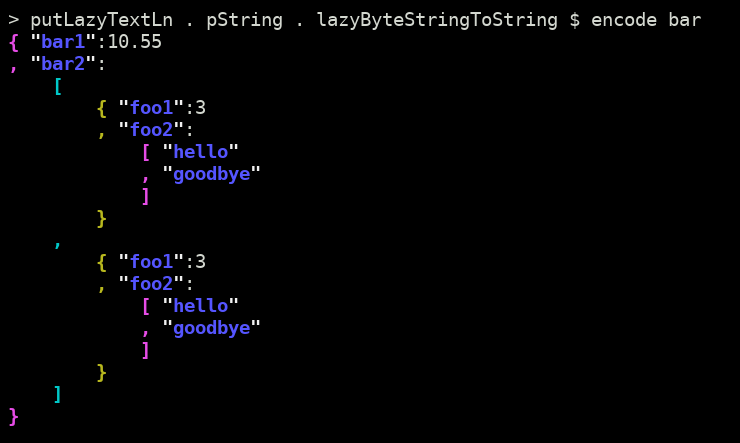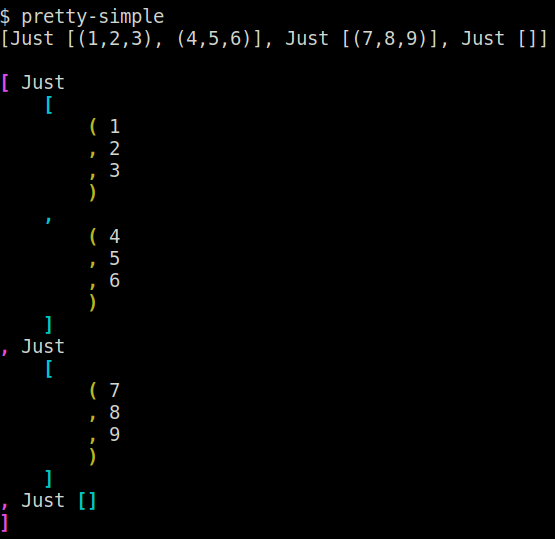cdepillabout / Pretty Simple
Programming Languages
Projects that are alternatives of or similar to Pretty Simple
Text.Pretty.Simple
pretty-simple is a pretty printer for Haskell data types that have a Show
instance.
For example, imagine the following Haskell data types and values:
data Foo = Foo { foo1 :: Integer , foo2 :: [String] } deriving Show
foo :: Foo
foo = Foo 3 ["hello", "goodbye"]
data Bar = Bar { bar1 :: Double , bar2 :: [Foo] } deriving Show
bar :: Bar
bar = Bar 10.55 [foo, foo]
If you run this in ghci and type print bar, you'll get output like this:
> print bar
Bar {bar1 = 10.55, bar2 = [Foo {foo1 = 3, foo2 = ["hello","goodbye"]},Foo {foo1 = 3, foo2 = ["hello","goodbye"]}]}
This is pretty hard to read. Imagine if there were more fields or it were even more deeply nested. It would be even more difficult to read.
pretty-simple can be used to print bar in an easy-to-read format:
Usage
pretty-simple can be easily used from ghci when debugging.
When using stack to run ghci, just append the --package flag to
the command line to load pretty-simple.
$ stack ghci --package pretty-simple
Once you get a prompt in ghci, you can use import to get pretty-simple's
pPrint
function in scope.
> import Text.Pretty.Simple (pPrint)
You can test out pPrint with simple data types like Maybe or tuples.
> pPrint $ Just ("hello", "goodbye")
Just
( "hello"
, "goodbye"
)
Features
- Easy-to-read
- Complex data types are simple to understand.
- Color
- Prints in color using ANSI escape codes.
- It is possible to print without color by using the
pPrintNoColorfunction.
- Rainbow Parentheses
- Easy to understand deeply nested data types.
- Configurable
- Indentation, compactness, colors and more are configurable with the
pPrintOptfunction.
- Indentation, compactness, colors and more are configurable with the
- Fast
- No problem pretty-printing data types thousands of lines long.
- Works with any data type with a
Showinstance- Some common Haskell data types have a
Showinstance that produces non-valid Haskell code.pretty-simplewill pretty-print even these data types.
- Some common Haskell data types have a
Why not (some other package)?
Other pretty-printing packages have some combination of these defects:
- No options for printing in color.
- No options for changing the amount of indentation
- Requires every data type to be an instance of some special typeclass (instead
of just
Show). - Requires all
Showinstances to output valid Haskell code.
Other Uses
Pretty-print all GHCi output
The pPrint function can be used as the default output function in GHCi.
All you need to do is run GHCi like this:
$ stack ghci --ghci-options "-interactive-print=Text.Pretty.Simple.pPrint" --package pretty-simple
Now, whenever you make GHCi evaluate an expression, GHCi will pretty-print the
result using pPrint! See
here
for more info on this neat feature in GHCi.
Pretty-printing JSON
pretty-simple can be used to pretty-print any String that is similar to
Haskell data types. The only requirement is that the String must correctly
use brackets, parenthese, and braces to indicate nesting.
For example, the
pString
function can be used to pretty-print JSON.
Recall our example from before.
data Foo = Foo { foo1 :: Integer , foo2 :: [String] } deriving Show
foo :: Foo
foo = Foo 3 ["hello", "goodbye"]
data Bar = Bar { bar1 :: Double , bar2 :: [Foo] } deriving Show
bar :: Bar
bar = Bar 10.55 [foo, foo]
You can use aeson to turn these
data types into JSON. First, you must derive
ToJSON
instances for the data types. It is easiest to do this with Template Haskell:
{-# LANGUAGE TemplateHaskell #-}
$(deriveJSON defaultOptions ''Foo)
$(deriveJSON defaultOptions ''Bar)
If you run this in ghci and type encode bar, you'll get output like this:
> import Data.Aeson (encode)
> putLazyByteStringLn $ encode bar
{"bar1":10.55,"bar2":[{"foo1":3,"foo2":["hello","goodbye"]},{"foo1":3,"foo2":["hello","goodbye"]}]}
Just like Haskell's normal print output, this is pretty hard to read.
pretty-simple can be used to pretty-print the JSON-encoded bar in an
easy-to-read format:
(You can find the lazyByteStringToString, putLazyByteStringLn,
and putLazyTextLn in the ExampleJSON.hs
file.)
Pretty-printing from the command line
pretty-simple includes a command line executable that can be used to
pretty-print anything passed in on stdin.
It can be installed to ~/.local/bin/ with the following command. Note that you
must enable the buildexe flag, since it will not be built by default:
$ stack install pretty-simple-2.2.0.1 --flag pretty-simple:buildexe
When run on the command line, you can paste in the Haskell datatype you want to be formatted, then hit Ctrl-D:
This is very useful if you accidentally print out a Haskell data type with
print instead of pPrint.
Contributions
Feel free to open an issue or PR for any bugs/problems/suggestions/improvements.





